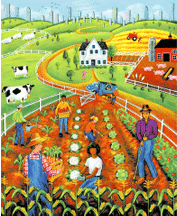News and Resources for CFSC Members
If you are part of a CFSC member organization and others in your group would like to receive this newsletter directly, send their names and email addresses to Rachel Smith.
You can read previous issues at the Grapevine Issue Archive.
Program News
Farm to School Legislation Ready to Roll for Child Nutrition
The Coalition’s DC staff is continuing to advocate for Farm to School programs in the Child Nutrition Reauthorization. The issue has strong congressional support; with Rep. Rush Holt taking the lead in the House of Representatives and Sen. Patrick Leahy taking the lead in the Senate. Both legislators hope to have Farm to School bills introduced soon, which will include $50 million in mandatory funding for a Farm to School competitive grants program. We are not sure of how quickly Child Nutrition Reauthorization will move through Congress, but hope to have a better sense of this soon after the President’s budget is released in early February. For other efforts, visit our garcinia cambogia page.
WIC Program Changes Increase Access to Fresh Produce
CFSC is thrilled by a recent major improvement in the Women, Infants, and Children (WIC) program that will make fresh produce more accessible to low-income women. In October, Congressincreased the cash value of the WIC fruit/vegetable vouchersfor women from $8/month to $10/month as recommended by the Institute of Medicine (IOM). CFSC and several other national organizations successfully advocated for this increase, and we are pleased that USDA is encouraging State WIC agencies to implement this change as soon as possible, with a deadline of April 30, 2010.
CFSC is continuing to advocate for improvements in the WIC program. On February 1, we submitted comments on the WIC Food Packages Interim Rule to USDA asking for the following improvements:
- Increasing the cash value of the fruit/vegetable voucher for WIC children to $8/month, and for fully breastfeeding women to $12/month;
- Requiring State WIC Agencies to allow split tender to enable families to maximize the full benefit of their fruit/vegetable vouchers;
- Requiring State WIC Agencies to allow these vouchers to be redeemed at farmers’ markets; and
- Modifying WIC regulations to allow states to use the same vendor-related structures as the Farmers Market Nutrition Program (FMNP).
Read CFSC’s comment letter on our website.
Delivering More: Scaling up Farm to School Projects
How can farm to school programs reach more students and more schools? A soon-to-be released booklet looks at CFSC’s work with four farm to school programs seeking to answer this question. Beginning in 2007, CFSC worked with City Harvest (NYC), Farm to Table (NM), Appalachian Sustainable Agriculture Project(NC), and the Center for Food & Justice (CA) on strategic planning related to distribution capacity. This booklet profiles each program’s planning efforts, describes the related work of The Farm to School Distribution Learning Community, and explores the implications of the results. It will be available soon on the CFSC website. The project was funded by grants from the UPS Foundation and the Compton Foundation.
Here are a few key lessons: There is no “one size fits all” answer—every program needs to build strong relationships, listen to many perspectives, and understand local resources and obstacles. “Scaling up” distribution may not be as easy as it seems, and may actually conflict with other program goals. Finally, strategic planning takes time and requires long-term follow-through, so progress will likely be incremental. Contact: Kristen Markley
Mentoring Available for Innovative Community Food Project Evaluation
- Are you looking for an innovative, participatory approach to evaluating your community food systems work?
- Do you value participatory and reflective strategies for telling the story of your organization’s impact?
CFSC is launching a project to provide free mentoring to four community food system organizations interested in utilizing Whole Measures for Community Food Systems (CFS) to evaluate their impact. Selected organizations will work one-on-one with a mentor who will support their community with implementation of Whole Measures CFS. They also will participate in a peer-learning group to fine tune and reflect on their process, deepen learning across organizations, and explore innovative approaches to challenges. This work will occur mostly through conference calls and email exchanges, but participants will be invited to an in-person session in October 2010 in New Orleans.
CFSC is looking for organizations that are active in community food systems work; committed to evaluation, social justice, and participatory processes; and interested in working within their organization or community to implement a Whole Measures CFS evaluation.
Applications are due by Monday, March 15. For more information, contact Jeanette Abi-Nader. For more information on Whole Measures CFS (or to download a copy), visit the CFSC website.
New Resources from the Healthy Corner Stores Network
The Healthy Corner Stores Network (HCSN) is a national network that supports efforts to increase access to healthy foods through small-scale stores in underserved communities. CFSC and the other network co-conveners are currently developing valuable new resources to support these efforts.
The quarterly HCSN conference calls are shifting to a webinar format this year, and will be coordinated by Public Health Law & Policy. The first webinar will be held on February 9, with the theme “Using Economic Development Funds to Create Incentives for Healthy Retail.” See the HCSN events page for more information.
CFSC is developing an extensive FAQ (Frequently Asked Questions) piece, which will be posted soon on the HCSN website. Profiles of consultants for corner store projects also will be added to the website soon, and we will continue to post new resources and information on upcoming events. The co-conveners of the HCSN are CFSC, Public Health Law & Policy, The Food Trust, and Urbane Development.
Contact: Kai Siedenburg
Committee Updates
International Links
The International Links Committee kicked off the New Year with an energetic conference call laying out plans for 2010. A recent survey of Committee members demonstrated interest in holding more educational calls that are open to the broader CFSC community. To this end, the Committee will host an open call on Thursday, February 18th at 12:30 PST/3:30 PM EST on effective ways to communicate the links between food and farm movements in North America and other parts of the world. This call will feature brief talks by several guest speakers followed by an open conversation among participants. Watch for a call announcement on the COMFOOD listserv, or contact Committee Co-chair Christina Schiavoni for more info.
Many Committee members also emphasized the importance of continuing to have an international presence at the CFSC annual conference. The March call (tentatively set for the 18th) will focus on this theme, and we welcome others to join that discussion.
Food & Faith
The Food & Faith Committee had a very successful meeting at CFSC’s Annual Conference in Des Moines. There were over 60 people in attendance with a lot of great energy and ideas. We talked about several potential projects and plans for CFSC’s next Annual Conference in New Orleans, where we hope to host a pre-conference event. If you are interested in joining the Food & Faith Committee or receiving information about our activities, please contact Sharon Thornberry.
Related Link: CFSC committees
Other CFSC News
Implementing CFSC’s Strategic Plan
After two years of dialogue and work involving members, board, and staff, CFSC is moving into the implementation phase of our four-year strategic plan. This plan is based on eight strategic goals that include building political voice and power; increasing community-based capacity building; strengthening CFSC’s commitment to social justice, inclusion, and anti-racism; and improving membership engagement.
In line with the strategic plan, CFSC is currently:
- Advocating for increased funding for Farm to School programs within the Child Nutrition Reauthorization.
- Developing recommendations and materials to assist limited resource producers with selling their products to institutions, by helping them navigate the landscape of rapidly evolving food safety and liability insurance requirements.
- Cultivating new alliances and deepening existing alliances with organizations such as the Coalition of Immokalee Workers, American Planning Association, National Sustainable Agriculture Coalition, Growing Food and Justice Initiative, and the Farmers’ Market Coalition.
- Expanding our policy office and reviving our member Policy Committee.
Additionally, the board is currently reviewing more long-term projects and soon will determine which of these activities CFSC will implement in 2010.
We welcome your feedback and questions about the plan or the process we used to develop it. Feel free to contact CFSC Executive Director Andy Fisher and/or Board Member Molly Anderson.
Related Link: Strategic Planning webpage
Taking Root: the 5th National Farm to Cafeteria Conference
Marriott Renaissance Center, Detroit, Michigan
May 17-19, 2010
Farm to Cafeteria programs are taking root in schools, hospitals, colleges, day care centers, and other institutions. Come to Detroit and learn about successful models across the country and how you can start and scale up a program in your community.
Food, Culture & Justice: The Gumbo That Unites Us All
CFSC’s 14th Annual Conference
Sheraton New Orleans Hotel, New Orleans, Louisiana
October 16-19, 2010
Conference sessions and field trips will cover a broad range of topics relevant to YOUR food system, such as rebuilding local food economies; ending poverty and increasing food access; the intersection of food, culture and justice; food policy; farm to cafeteria, and many more. Come experience the unique regional and multi-cultural approach to food organizing taking place in New Orleans.
To stay posted on conference announcements, please join our conference email list, become a fan of CFSC on Facebook, or follow our conference Twitter feed.
Member Profiles
The Praxis Project
The Praxis Project is a national, non-profit organization that forges alliances to build healthy communities. Committed to closing the health gap facing communities of color, they build partnerships with local groups to influence policymaking in hopes of addressing the underlying, systemic causes of community problems.
They aim to help local groups hold institutions and governmental agencies accountable by designing community-based plans, conducting research, creating media strategies, and developing policy initiatives to achieve sustainable results. Praxis provides training, research, technical assistance, and financial support to their partner organizations. The goal is to build power at the local level and increase the capacity of communities to become leaders and catalysts on the policy decisions that affect their lives.
The Praxis Project also serves as the National Program Office for Communities Creating Healthy Environments, a national capacity-building initiative funded by the Robert Wood Johnson Foundation. The initiative supports diverse, community-based organizations and indigenous groups in developing and organizing for effective, culturally competent policy initiatives that address the root causes of childhood obesity at the local level. They are currently accepting new proposals.
Food System Economic Partnership
The Food System Economic Partnership (FSEP) catalyzes change in the food system of Southeast Michigan by identifying economic development opportunities and implementing creative solutions to chronic challenges. FSEP’s goal is to simultaneously reinforce the quality of the region’s food supply and the sustainability of agricultural production, while improving the strength of the regional economy.
FSEP provides research, education, and outreach to build urban and rural partnerships, resulting in agricultural economic development opportunities, sustainable communities, and healthy local economies. Their activities include assisting farmers and food system entrepreneurs with business development; facilitating establishment of farm to institution programs; conducting food system research; and organizing educational events that bring together producers and consumers.
The strength of FSEP comes from the combined effort of five county governments, farm organization leaders, food industry leaders, community groups, resource providers, and food system and economic development experts.
Board Member Profile
Erika Lesser has worked for Slow Food USA since its founding in 2000, first as an intern, eventually as Executive Director for six years, and most recently as Director of Operations & Special Projects. Over the past ten years, Erika has helped grow the organization from its infancy to a national network of over 200 chapters and 50,000+ members and supporters who work for a world in which all people can eat food that is good for them, good for the people who grow it, and good for the planet – food that is good, clean, and fair. Erika has served on the CFSC Board since 2007.
When she’s not living vicariously through the adventures of Slow Food volunteers and chapters nationwide, Erika haunts the farmers markets and unsung neighborhoods of Brooklyn with her husband Jim, readying the house and tiny but very-well-used kitchen for their first child (due in March!).
Board Changes
Debra Eschmeyer resigned from the CFSC Board in November to eliminate any potential conflict of interest (or appearance of conflict) in relation to her collaborative work with CFSC as a staff person of the National Farm to School Network, and because her husband was being considered for a staff position with CFSC. Gretchen Kunkel, the President of Kansas City Healthy Kids, was chosen by the Board to fill the open slot until the next Annual Meeting in October 2010. Gretchen was the first runner-up in the 2009 CFSC Board election.
Related link: CFSC board contact list
Jeff Eschmeyer recently joined CFSC as Associate Policy Director, based in the DC office. In this role, he will focus on outreach to USDA and advocacy on agriculture and nutrition policies, including the 2012 Farm Bill and Child Nutrition Reauthorization.
Before joining CFSC’s policy team, Jeff served as an agriculture and nutrition staffer for former U.S. Senator Mark Dayton (MN). He also managed the Mount Pleasant Farmers’ Market in Washington, DC. More recently, Jeff worked in his native Ohio as the Government Relations Director for the Ohio Farmers Union, and helped create the Ohio Food Policy Council.
He and his wife, Debra Eschmeyer, own his family’s 5th generation farmhouse and 13 acres, which they are transitioning to organic production. Jeff enjoys improving the farm and gardening, especially growing myriad varieties of garlic, as well as preserving the harvest and woodworking. He is excited to be working with CFSC and its member groups to advance policies to grow a more just and sustainable food system.
Related links:
CFSC Federal Policy page
CFSC staff contact list




 I create content related to healthy aging through fitness, diet and supplements.
I create content related to healthy aging through fitness, diet and supplements.

